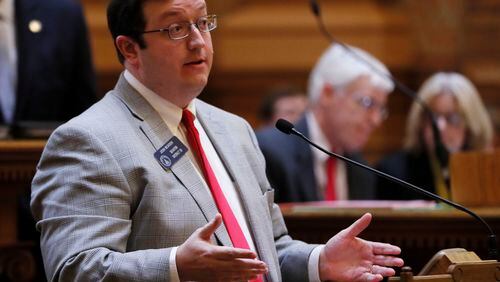Within hours of this week's formal announcement that Amazon.com would not bring a second headquarters and 50,000 high-paying jobs to Atlanta, a first challenge was issued to the Republican leaders of Georgia's new political order.
Representatives of eight social conservative groups, whose members populate much of the base of the state GOP, published a demand that the next General Assembly again take up “religious liberty” legislation that has roiled the Capitol for the last four years.
During the 2018 session, business interests in the Capitol had insisted that the debate be shut down while state recruiters sought the massive economic development prize dangled by Amazon.com. LBGT groups say the measure is intended to legalize discrimination against same-sex couples, and many of Georgia’s largest corporate leaders agree.
The religious conservative leaders called for a revival of the fight hours after Amazon.com revealed that it would split its second headquarters between Long Island City, N.Y., and Crystal City, Va, with an additional logistics hub in Nashville, Tenn.
Two of the states – Virginia and Tennessee – have statutory protections for religion similar to that which these Georgia groups say they’re seeking. “We trust that Amazon’s announcement will finally put to rest the bogus argument that passing [such legislation] will drive away business,” their statement said.
The point is a debatable one. Virginia and Tennessee passed their laws in 2007 and 2009, respectively, long before the U.S. Supreme Court recognized same-sex marriage as a constitutionally backed right. Time and intent matter.
In any case, the Amazon.com decision was merely the occasion for the religious right’s challenge, not the motivation.
The demand by the groups, which include the Georgia chapter of Ralph Reed’s Faith and Freedom Coalition and the Georgia Baptist Mission Board, is really a first test of Republican ground that shifted on Election Day.
Brian Kemp will become the next governor with a slim 50.2 percent of the vote, after building huge majorities in 130 of Georgia’s 159 counties — the vast majority of them rural or exurban.
In metro Atlanta’s suburbs, the Republican grip slipped. Democrats picked up 13 state legislative seats, most of them in the northern arc. Many GOP lawmakers who survived must now consider themselves vulnerable. State Rep. Sharon Cooper of Marietta, first elected in 1996, won with just 51.6 percent of the vote. In the Senate, P.K. Martin of Lawrenceville now has a target on his back. His winning margin was a slim 51.9 percent.
What’s forming in Republican ranks is a gap that isn’t just geographic, but cultural. Nor is it limited to same-sex marriage.
In the 2016 presidential contest, Democrat Hillary Clinton barely won Cobb County, and only with a plurality of votes. On Nov. 6, Democrat Stacey Abrams won Cobb by 30,000 votes.
“We didn’t have 30,000 voters move into Cobb County in two years. That means we lost Republican votes,” said Jason Shepherd, chairman of the Cobb County Republican party.
“I can’t tell you how many doors I knocked on, which were, according to my list hard ‘R’ voters, who said they weren’t going to vote for a guy who was pointing a gun at a kid,” he said.
The reference, of course, was to the Kemp TV ad in which the candidate appeared to point a shotgun at an actor playing the young suitor to one of his daughters. It was based on the old joke about shotgun marriages — made in a season of gun massacres.
Rural Georgia saw it one way. Suburbia another.
Shepherd and other prominent Republicans are urging a renewed emphasis on economic issues. Conservative arguments that suburban Republicans aren’t conservative enough won’t wash, they warn. U.S. Rep. Karen Handel, R-Roswell, might have lost her seat in Congress on Election Day, Shepherd pointed out, but she still outpolled Kemp in the Sixth District.
At the same time, Republicans in Georgia must come to grips with the fact that in the run-up to 2020, when President Donald Trump will be on the ballot, they won’t always be in control of the messaging.
State Rep. Rich Golick, R-Smyrna, wasn’t on the Nov. 6 ballot. He’s retiring from the Legislature. His seat went Democratic.
“In the past both parties in Georgia have had the luxury of being able to get some separation from the generational dysfunction of Washington,” Golick said. But Election Day was a referendum on Trump. In many cases, competence, moderation and experience carried no weight in the ‘burbs, the lawmaker said.
“The hope from many on the state level is that our national leaders will adjust accordingly, re-focus on those kitchen table issues and be successful two years from now — along with the rest of the ticket,” Golick said.
But that’s 2020. Come January, the issue of same-sex marriage may be the first test of changing relationships among Republican state lawmakers. During his campaign, Kemp promised that, if elected, he would support “religious liberty” legislation that mirrored federal legislation passed in 1994. Religious conservatives plan to hold him to it.
They consider themselves in a position not dissimilar to African-American women in the Democratic party – essential to victory, but constantly shortchanged.
“My assessment of the last eight years of the Georgia General Assembly is that the folks in power, the people at the controls of state government, did make deals with the Democratic party rather than try to make any sort of accommodation to the conservatives within the House caucus and the Senate caucus,” said state Sen. Josh McKoon, R-Columbus, one of the foremost champions of “religious freedom” legislation in the Capitol.
“So yes, I think there’s been a tremendous pent-up demand on this issue,” he said. “I think people are like, okay, we’ve elected a guy now — he’s not a party-switcher. He’s been a Republican his whole life. Charlie Brown is finally going to get to kick the football. This is finally going to happen.”
McKoon had returned to the Capitol for the special session called by Gov. Nathan Deal, who indeed was once a Democrat. As was Sonny Perdue before him.
McKoon was defeated in last May’s GOP primary for secretary of state. He won’t be returning to the Senate. Even so, he’ll continue to push his issue as the new executive director of the state chapter of the Faith and Freedom Coalition.
McKoon pointed out that the defeat of more moderate Republican lawmakers in the suburbs could make it easier for GOP caucuses in the House and Senate to come to a consensus on a contentious issue.
“I’m not saying that [religious liberty legislation] solves your election problem for suburban Republicans. What I am saying is you’ve got to produce,” McKoon said. “You’ve got to have substantive solutions to problems that people in these communities are facing.”
Any ill consequences can be laid at the feet of Republican leaders in the state Capitol who have silently blocked his efforts. “This could have been over four years ago. So a lot of the damage that was inflicted, was inflicted by dithering by people in authority,” McKoon said.
One thing to think about: Another champion of "religious liberty" legislation is state Rep. Sam Teasley, R-Marietta. Going into a Friday recount, Teasley was running 173 votes behind Democrat Mary Frances Williams. The recount widened his deficit by a single vote.
Republicans across north metro Atlanta are wondering whether same-sex marriage was a factor in that contest. The answer is, probably so.
Jeff Graham, executive director of Georgia Equality, said the LGBT rights group put $2,000 in internet ads behind Teasley’s opponent. It was a modest investment, but when a candidate is short 174 votes, even small sums matter.








